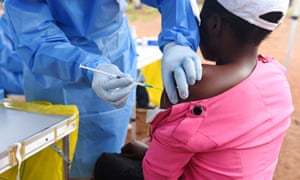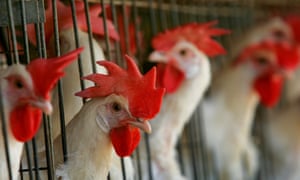Extract from The Guardian
A health worker administers Ebola vaccine to a woman in the Democratic Republic of the Congo Photograph: Olivia Acland/Reuters
If antibiotic resistance continues to grow, we may look back on the deaths of the coronavirus pandemic of 2020, and say: “Really? Was that all?” Resistance could end the age of medical progress, returning humanity to a time when minor injuries and routine operations could be fatal. The over-prescription of antibiotics to humans explains in part why bacteria are evolving to resist it, and why researchers are predicting 10 million deaths a year from antibiotic resistance by 2050. Antibiotic use in the intensive and unfathomably cruel production of meat is as pernicious. Factory farming strains animal health. Breeding sows that are not given enough time to recover before being impregnated again, and chickens in crowded cages suffering from heat stress that brings salmonella and E coli, need repeated doses. In 2012, when the then chief medical officer, Sally Davies, warned that antibiotics were losing their “effectiveness at a rate that is both alarming and irreversible”, she compared the looming health crisis to global warming. To make her comparison complete, we can add that meat eating does indeed contribute disproportionately to the production of greenhouse gasses.
Ban the use of antibiotics in farming, then. Treat meat, cow milk and cheese as we treat tobacco and alcohol and hit them with punitive taxes. Make the illegal trade in wild animals as great a crime as the illegal trade in weapons.
"Rather than change minds, the corona crisis is cementing them"
However rational such stirring declarations may be, I feel I am no longer connected to myself or the world around me when I issue them. I am not a vegan. If changing facts changed minds, I should become one – as should you, in all likelihood. Even if individuals change, the dominant culture makes demands for society to change appear ridiculously utopian. Imagine a politician campaigning for stiff restrictions on meat consumption. Critics would accuse him or her of punishing the poor – for people who barely think of the poor always invoke them when their pleasures are threatened. They would be damned for wanting to ban the good old Sunday lunch and the joy a Big Mac brings. Our grandchildren may look back and find our abuse of animals incomprehensible. For the moment, arguments to stop abuse provoke incomprehension.
Rather than change minds, the corona crisis is cementing them. No one knows its political and cultural consequences, only that there will be consequences. Ignorance has not stopped Jeremy Corbyn saying the pandemic proved his socialism was “absolutely right” and Nigel Farage saying that, on the contrary, it showed he was right about free movement being doomed. Trump blames China. China blames America. In other words, they are all saying and doing what they would have said and done if the virus had never jumped the species barrier and no one outside China had heard of Wuhan’s wet markets.
Today’s suffering dominates our thoughts, but beneath it two explanations of human behaviour are competing. Optimists believe that governments and peoples will adapt to new circumstances and recognise new realities. We will soon learn if they are right.
The great physicist Max Planck put the pessimistic case in 1950. A new scientific truth does not triumph by convincing its opponents, he said. Rather, “its opponents eventually die and a new generation grows up that is familiar with it”.
Planck’s admirers condensed his argument into a phrase that is a little too resonant today: “Science advances one funeral at a time.”
• Nick Cohen is an Observer
A disregard for creature welfare is often central to disease. But politicians won’t dare make the connection
The
boast that “when the facts change, I change my mind” is a proud one.
“When the facts change, I reinforce my prejudices” is truer. If you want
proof, look at the coronavirus that has changed everything and consider
the undisputed fact that it spread because of humanity’s abuse of
animals.
Imagine a world where facts changed minds. The United Nations, governments and everyone with influence would now be saying we should abandon meat or at a minimum cut down on consumption. Perhaps my reading is not as wide as it should be, but I have heard nothing of the sort argued. Making the case would be child’s play and would not be confined to emphasising that Covid-19 probably jumped species in Wuhan’s grotesque wet markets. The Sars epidemic of 2002-04 began in Guangdong, probably in bats, and then spread to civet cats, sold in markets and eaten in restaurants. The H7N9 strain of bird flu began in China, once again, and moved to humans from diseased poultry.
China is a viral petri dish because the Communist party silences voices that warn of danger, as the heroic doctor Li Wenliang found. Centuries of imperial and socialist dictatorship have taught people to respect the adage “The shot hits the bird that pokes its head out”. Repression combines with folk beliefs in the medicinal power of animal carcasses, a deadly quackery that the world’s fastest growing middle class has the money to indulge. Bats, which may be the original source of coronavirus as well as Sars, are meant to restore eyesight. The palm civet is devoured as a sham cure for insomnia.

Imagine a world where facts changed minds. The United Nations, governments and everyone with influence would now be saying we should abandon meat or at a minimum cut down on consumption. Perhaps my reading is not as wide as it should be, but I have heard nothing of the sort argued. Making the case would be child’s play and would not be confined to emphasising that Covid-19 probably jumped species in Wuhan’s grotesque wet markets. The Sars epidemic of 2002-04 began in Guangdong, probably in bats, and then spread to civet cats, sold in markets and eaten in restaurants. The H7N9 strain of bird flu began in China, once again, and moved to humans from diseased poultry.
China is a viral petri dish because the Communist party silences voices that warn of danger, as the heroic doctor Li Wenliang found. Centuries of imperial and socialist dictatorship have taught people to respect the adage “The shot hits the bird that pokes its head out”. Repression combines with folk beliefs in the medicinal power of animal carcasses, a deadly quackery that the world’s fastest growing middle class has the money to indulge. Bats, which may be the original source of coronavirus as well as Sars, are meant to restore eyesight. The palm civet is devoured as a sham cure for insomnia.

If antibiotic resistance continues to grow, we may look back on the deaths of the coronavirus pandemic of 2020, and say: “Really? Was that all?” Resistance could end the age of medical progress, returning humanity to a time when minor injuries and routine operations could be fatal. The over-prescription of antibiotics to humans explains in part why bacteria are evolving to resist it, and why researchers are predicting 10 million deaths a year from antibiotic resistance by 2050. Antibiotic use in the intensive and unfathomably cruel production of meat is as pernicious. Factory farming strains animal health. Breeding sows that are not given enough time to recover before being impregnated again, and chickens in crowded cages suffering from heat stress that brings salmonella and E coli, need repeated doses. In 2012, when the then chief medical officer, Sally Davies, warned that antibiotics were losing their “effectiveness at a rate that is both alarming and irreversible”, she compared the looming health crisis to global warming. To make her comparison complete, we can add that meat eating does indeed contribute disproportionately to the production of greenhouse gasses.
Ban the use of antibiotics in farming, then. Treat meat, cow milk and cheese as we treat tobacco and alcohol and hit them with punitive taxes. Make the illegal trade in wild animals as great a crime as the illegal trade in weapons.
"Rather than change minds, the corona crisis is cementing them"
However rational such stirring declarations may be, I feel I am no longer connected to myself or the world around me when I issue them. I am not a vegan. If changing facts changed minds, I should become one – as should you, in all likelihood. Even if individuals change, the dominant culture makes demands for society to change appear ridiculously utopian. Imagine a politician campaigning for stiff restrictions on meat consumption. Critics would accuse him or her of punishing the poor – for people who barely think of the poor always invoke them when their pleasures are threatened. They would be damned for wanting to ban the good old Sunday lunch and the joy a Big Mac brings. Our grandchildren may look back and find our abuse of animals incomprehensible. For the moment, arguments to stop abuse provoke incomprehension.
Rather than change minds, the corona crisis is cementing them. No one knows its political and cultural consequences, only that there will be consequences. Ignorance has not stopped Jeremy Corbyn saying the pandemic proved his socialism was “absolutely right” and Nigel Farage saying that, on the contrary, it showed he was right about free movement being doomed. Trump blames China. China blames America. In other words, they are all saying and doing what they would have said and done if the virus had never jumped the species barrier and no one outside China had heard of Wuhan’s wet markets.
Today’s suffering dominates our thoughts, but beneath it two explanations of human behaviour are competing. Optimists believe that governments and peoples will adapt to new circumstances and recognise new realities. We will soon learn if they are right.
The great physicist Max Planck put the pessimistic case in 1950. A new scientific truth does not triumph by convincing its opponents, he said. Rather, “its opponents eventually die and a new generation grows up that is familiar with it”.
Planck’s admirers condensed his argument into a phrase that is a little too resonant today: “Science advances one funeral at a time.”
• Nick Cohen is an Observer

No comments:
Post a Comment